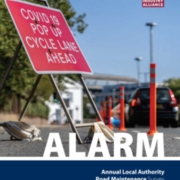Maintaining local roads to target conditions is still out of reach for local authorities
Each year the Asphalt Industry Alliance (AIA) commissions an independent survey of local authority highways departments in England (including London) and Wales.
The Annual Local Authority Road Maintenance (ALARM) survey – now in its 26th year – provides detailed insight into the funding and conditions of the local road network, based on information provided directly by those responsible for its maintenance. Its findings are used by stakeholders across the sector for tracking, benchmarking and planning purposes.
ALARM 2021 reports that, despite a 15% increase in highway maintenance budgets, maintaining local roads to target conditions is still out of reach for local authorities. While the extra funding was welcomed, budgets reported are still lower than they were two years ago, and road conditions have yet to see any significant improvement: the average frequency of road surfacing is now once every 68 years and the bill to fix the backlog of maintenance work on local roads in England and Wales is £10.24 billion.
Local authorities have a statutory duty to maintain the highway and are encouraged to do so using asset management principles. However, the up-down approach to funding that ALARM has reported for many years, does not support this. It results in wasteful patch and mend activity – as borne out by the large increase in the number of potholes filled over the past 12 months in England and Wales. Potholes and pothole repairs are the symptoms of an underfunded network, where hard-pressed highway teams continue to have to make tough decisions to keep all of their networks functioning.
Against this backdrop, it’s not surprising local authorities report that the increase in carriageway maintenance budgets has not yet translated into significant improvements in road conditions and reaching targets remains well out of reach. ALARM shows that if local authorities had sufficient funds to meet their target conditions there would be an additional 14,400 miles of roads in a good state of repair and another 2,000 fewer miles in urgent need of repair.
As the nation looks towards the future and reducing carbon emissions, sustainability will become increasingly important. Eight out of ten local authorities have declared a climate change emergency, but ALARM findings indicate that less than a quarter (23%) have targets to reduce the carbon footprint of the road materials they use. This indicates a possible disconnect between policy and practice and that more needs to be done to encourage uptake of the more sustainable material options available.
You can download the survey here
ENDS
- ALARM 2021 is the 26th annual survey and 63% of authorities responsible for local roads in England and Wales responded. This demonstrates that, even during the challenges of the COVID-19 pandemic, local authority highway engineers consider it to be a key vehicle for reporting on-going road conditions.
- This report summarises the key findings.
- The survey and data collation was carried out between December 2020 and February 2021. Unless otherwise stated, the findings are based on the financial year 2020/21, ending 31 March 2021. Where these are unavailable, figures for the calendar year 2020 were requested.


.png)



.png)